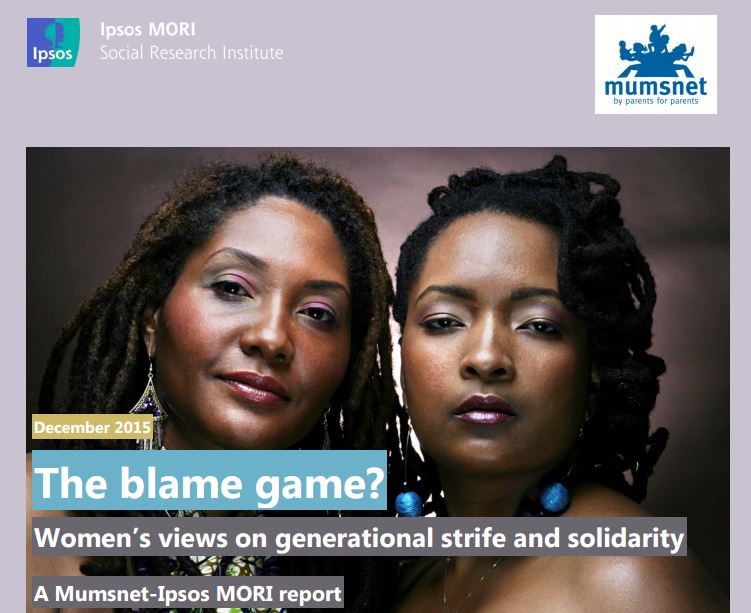A report by Mumsnet and Ipsos MORI reveals that, while the media and the public identify Baby Boomers (50-69-year-olds) as the most fortunate generation, conversations with Generation Xers (36-49-year-olds) show that they also recognise their own good fortune in enjoying many of the same benefits (free university education; a slice of property market profits) as their predecessors, but experiencing little of the resentment – although they also feel hit by the pressures of the modern world, and are worrying about their children’s futures.
Based on detailed analysis of the input from Mumsnet and Gransnet focus groups as well as nationwide polling data, ‘The Blame Game?’ outlines what British women think about intergenerational injustice, strife and solidarity – and highlights some novel perspectives.
- Female Baby Boomers, Generation Xers and Generation Yers (aged 15-35) alike, emphasise the progress in women’s equality over the last 40 years. Generations X and Y cite it as a reason to be grateful for being born when they were, and Baby Boomers refer to it as one way in which younger women are more fortunate than they are. Maternity benefits, better reproductive healthcare, improved childcare options and greater career opportunities for women were mentioned repeatedly by respondents of all ages.
- Housing wealth comes through as the strongest bone of intergenerational contention, with some members of Generation Y questioning the unwillingness of Baby Boomers to sell family homes to pay for care in later life, while Baby Boomers emphasise their years of scrimping and saving to cope with mortgage interest rates in double figures. However, overall there is a clear recognition from all the participants in the focus groups that this is a key issue for the future, and a shared worry for the youngest generations – whether they are the grandchildren or children of Baby Boomers or Generation X or whether they are Generation Y experiencing the sharp end themselves.
- Younger women (Generation Y) are most likely to express concern about the influence of internet-enabled technologies and social media pressures on the wellbeing of teens and children.
- The new polling data shows that Baby Boomers are seen as the generation who have had the best quality of life, by 39% of Britons, while both the Pre-war Generation and Generation Y are viewed as likely to experience the worst quality of life (by 29% and 27% respectively). The Pre-war generation themselves though are more content with their lot – half of those aged 70+ think they have had the best quality of life, while they are most worried about the very youngest Generation Z (those not yet 15).
- Similarly, the Pre-war Generation and Generation Y are the top priorities for government help (picked by 27% and 30% respectively), while Generation X is the lowest priority (including among Gen Xers themselves). Overall though, it is clear that all the generations are much more likely to worry about each other rather than put their own interests first. Baby Boomers and Generation X think those both older and younger than them should be top priorities for government help, those aged over 70 are most concerned about those aged 15 to 35, and although Generation Y are the one group who put themselves as top priority, they are nearly as concerned about the Pre-war Generation and those even younger than them – Generation Z.
- There is a similar consensus across the generations in the focus groups that the Pre-war Generation deserves all the government spending it gets after long lives of contribution and (often) hardship; there’s also widespread consensus that Generation Z – those under 15 – face a tough future.
Recent government decisions


